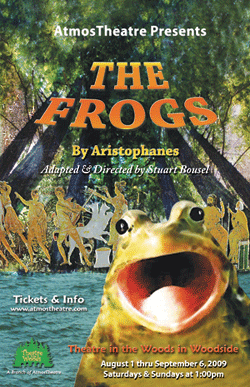From the Director, Stuart Bousel: Meta-theatrical before there was meta-theater, Aristophanes's The Frogs was an unprecedented success when it first premiered before ancient Greek audiences in 405 BC, receiving first place in the Festival of Dionysus that year. Since then it has carved a steady production history through the centuries, been the basis for two musical adaptations, and remains popular with the academic world as well due to its uniquely contemporary look at the era of its original setting. Though many of the social and political references of that time that litter the play may be obscure to the majority of modern audiences, the overriding theme of the death of "High Art" at the hands of "Popular Entertainment" has hardly ceased to be a hot topic of debate. Watching The Frogs now, one can't help but wonder what Aristophanes would have thought of the current celebrity craze, reality television and general society's continued preference for that which panders to them over that which challenges them. The greatest irony of The Frogs is that it is about as esoteric as plays can get, while being wrapped in a flashy package of sex jokes, physical humor, and low-brow antics that make the philosophical musings and cultural critique easier to swallow - and this has only become more the case with time as we now consider any Greek Theater "challenging," even when in reality all we're watching is a witty poet trash his fellow artists, poke fun at his audience, and parade a series of absurd and grotesque archetypes across the stage. If he also happens to be quietly sowing seeds of keen insight for those willing to do the work to find them, it is only because the true genius of Aristophanes lies in his optimistic belief that the high-brow and the low-brow can be effectively combined and that there are audiences out there smart enough to appreciate such a feat on the part of the poet. |

